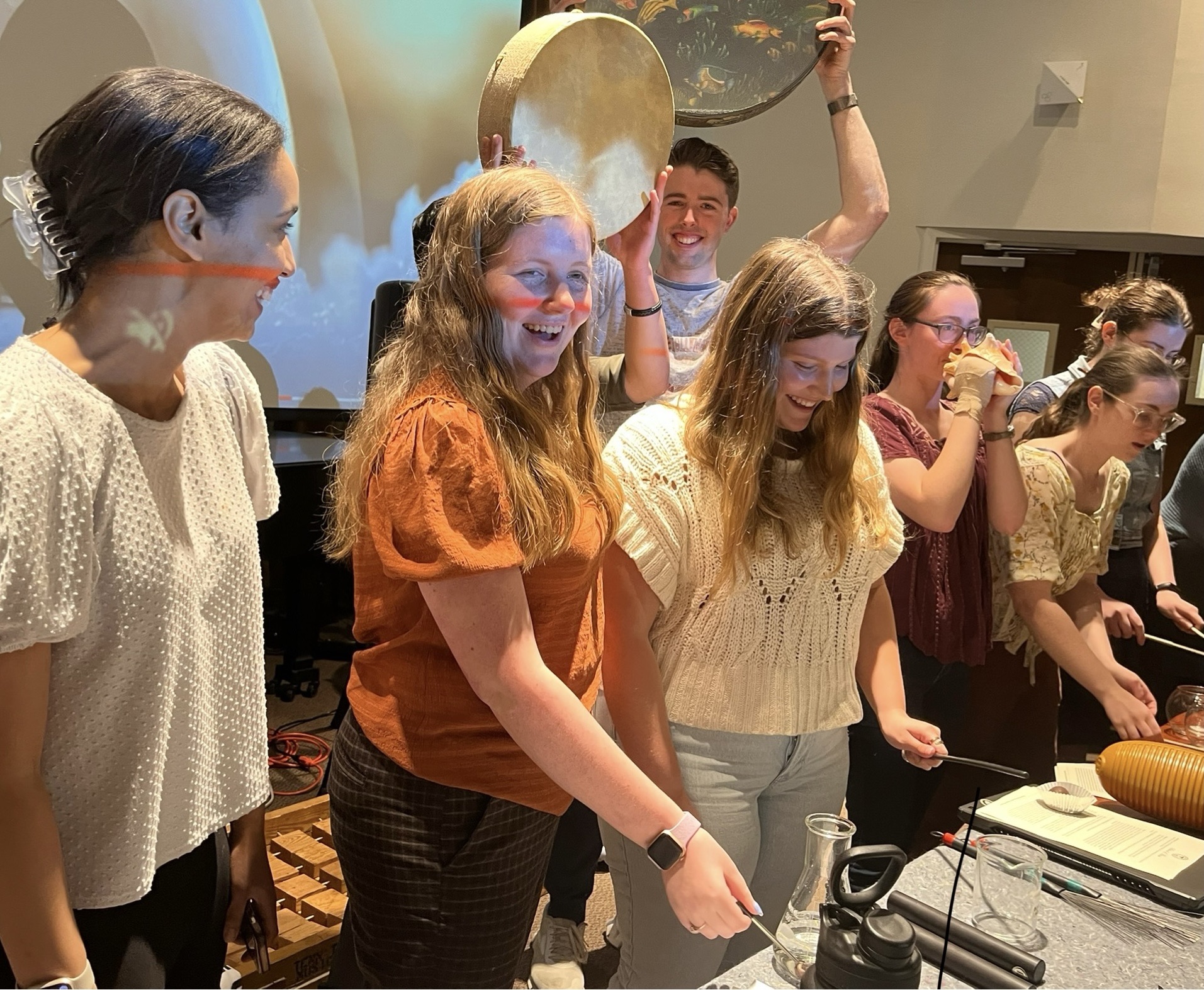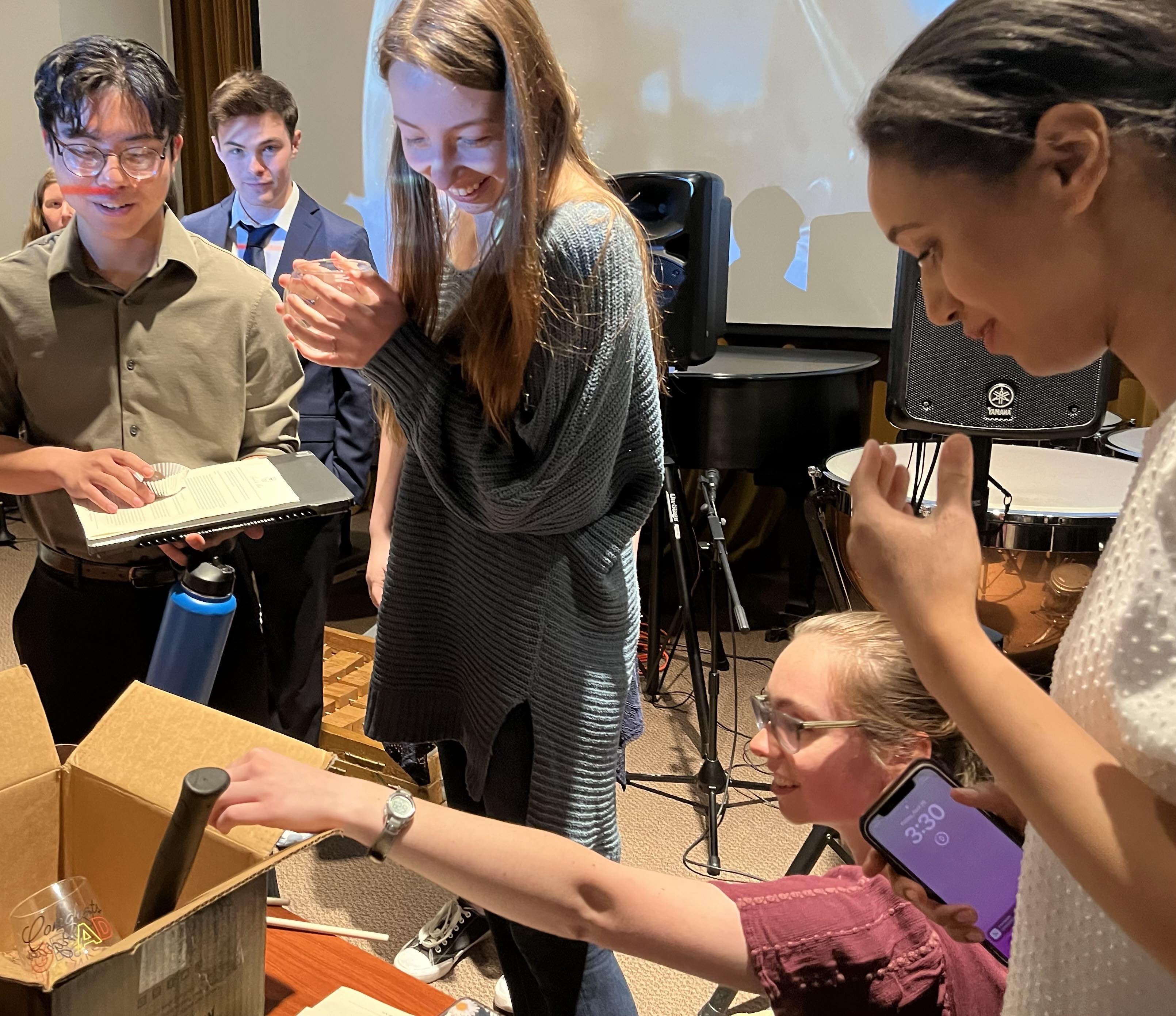Tech students explore the “Sounds of Science” in honors colloquium

Students in the “Sounds of Science” honors colloquium prepare for their end-of-semester
recital. From left: Faith Jolley, Olivia Furr, Drew Bucher, Mary Clemons, Sarah Owens,
Kelsey Rainey and Bradie McCarty.
Simon & Garfunkel may be known for “The Sounds of Silence,” but if a group of innovative
faculty leaders at Tennessee Tech University have their way, the institution could
soon be known for “The Sounds of Science.”
A class of juniors and seniors in Tech Honors, the university’s honors program, recently
took part in a semester-long colloquium by the same name, culminating with a recital
in which they offered musical interpretations of various scientific concepts.
The project came about after a fateful parking lot conversation in 2022 between Kathryn
Rust, Tech chemistry instructor, and Colin Hill, director of Tech’s School of Music.
Rust and Hill both volunteer with a local grief support ministry called Heart of the
Cumberland. At the group’s annual banquet, Hill led a group of middle schoolers in
a drum circle, which allowed the students to express feelings of grief through music.
“I kept thinking, what if we incorporate music as part of our teaching in sciences?
We could get more of an auditory demonstration of some of those scientific concepts,”
Rust said.
She stopped Hill outside the event venue to ask if he would consider a collaboration,
and he happily agreed.
“Rather than students ingesting factual information in lecture form, as it’s traditionally
done, she wanted to explore creating conceptual, aural and kinesthetic connections
between chemistry and music,” explained Hill. “I was fascinated by the idea, so we
created an honors colloquium course that explored this concept.”
To bring their concept to life, the pair approached Rita Barnes, director of Tech
Honors, who gave the project her full support.
“I thought immediately that it was the perfect colloquium: going into uncharted territory,”
said Barnes. “The two faculty members navigated the course through their own energy
for experimenting with how they teach their own field, a field they love, and they
took a leap of faith in sharing it with the students.”
The class met once a week for three hours, following a format that included a general
chemistry lecture, followed by a corresponding music theory lecture and then a hands-on
musical activity to link the two concepts.
For Rust, who has taught at Tech for nearly 35 years, the course was part of a deeper
vision for rethinking how universities teach and engage students in a changing world.
“I’m at a place in life where my kids are grown and my ideas have been revitalized,”
said Rust. “Students are more multisensory receivers and processors of information
today, so I really want to challenge people to look beyond what we’ve done in the
past to see how we can reach the students we have, not the students we were. Can we
present information in a different mode that can help students be more successful
in the classroom?"
Rust put that theory to the test with an end-of-semester recital. The students, who
represented a diverse group of majors and were mostly not trained musicians, performed
an original piece of music representing a concept, person or event in their field
of study. The results exceeded the instructors’ wildest expectations.
“The student performances were incredibly creative and original,” said Hill. “It was
fun watching many of these students perform a musical composition on stage for the
first time in their life."
Students in the honors colloquium prepare for classmate Emily Ellsworth’s (center) musical interpretation of the destruction of the coral reef. From left: Jeremy Eduave, Jacob Reed, Emily Ellsworth, Sarah Owens and Faith Jolley.
Barnes recalled how Emily Ellsworth, a senior biology major, composed a piece representing
the destruction of coral reefs – all without any previous music experience.
“The students were playing a mix of standard instruments as well as glassware, hammers
and a conch shell,” she added.
Likewise, a civil engineering major in the class performed an auditory representation
of a dam breaking amid heavy rains, while a chemical engineering major composed a
number conveying the distillation process using beakers as instruments. A computer
science major offered a musical interpretation of dual-processors and a music major
composed a piece representing the freezing of bubbles.
“It was really fabulous,” said Rust. “The students did an excellent job.”
With the success of this honors colloquium under her belt, Rust now has hopes of taking
her methods to other areas of campus and beyond. She already has two supporters in
Hill and Barnes.
“Many honors students became ‘honors students’ because they found a community in band
back in middle school,” said Barnes. “Music and other forms of art help us see more
possibilities and make us more open to learning in ways that we don't expect. That's
the beauty of this course.”
“When students engage their other senses, it seems to create a deeper connection and
understanding,” added Hill. “I’m a firm believer that Mrs. Rust’s approach is not
only innovative and fun, but incredibly impactful.”

